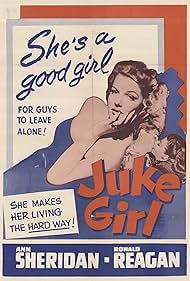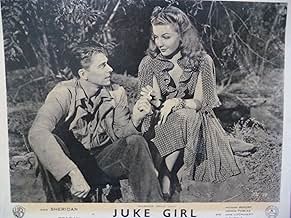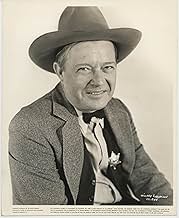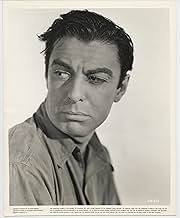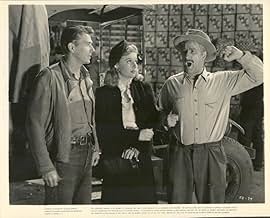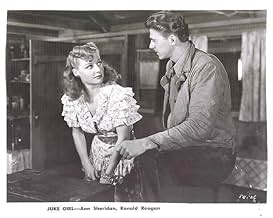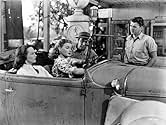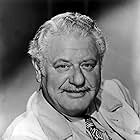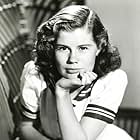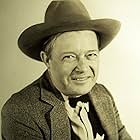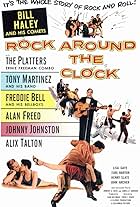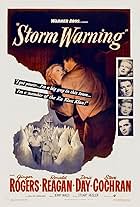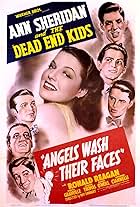Ajouter une intrigue dans votre langueDanny and Steve are migrant farm workers who wind up in Cat Tail, Florida. Cat Tail is run by Madden Packing and Danny works for Madden while Steve works for the underdog farmer named Nick. ... Tout lireDanny and Steve are migrant farm workers who wind up in Cat Tail, Florida. Cat Tail is run by Madden Packing and Danny works for Madden while Steve works for the underdog farmer named Nick. After the Tomato crop is destroyed by Madden, Steve takes Nick, Lola and the next crop to ... Tout lireDanny and Steve are migrant farm workers who wind up in Cat Tail, Florida. Cat Tail is run by Madden Packing and Danny works for Madden while Steve works for the underdog farmer named Nick. After the Tomato crop is destroyed by Madden, Steve takes Nick, Lola and the next crop to Atlanta where they sell it for big money. Danny is going up with Madden and thinks Steve i... Tout lire
- Réalisation
- Scénario
- Casting principal
- Cully
- (as Howard da Silva)
- Truck Driver
- (scènes coupées)
- Townsman
- (non crédité)
Avis à la une
A possible surprise for today's viewer is the political stance taken by actor Reagan in "Juke Girl" for the migrant workers and small farmers against the corruption of the local business interests, much different that the position taken by President Reagan years later. But then this picture was made many years before Reagan would become enamored of Nancy Davis and make her his second wife. She turned Reagan around in more ways than one.
The story is a good one, though a bit bottom heavy in that much of the excitement and action, including a murder, comes near the end. Steve Talbot (Reagan) and his best buddy, Danny Frazier (Richard Whorf), are hoboing across the country (the Depression was just winding down in 1942 because of World War II) looking for work of any kind with Steve preferring farm labor when they get involved with local labor unrest in a nowhere place called Cat Tail, Florida.
Just before reaching the small, farming community, a girl called Skeeter (Betty Brewer) befriends them and takes a particular liking to Steve. Her place in the story is somewhat vague other than to add a bit of humor and a down-home quality to the film. Steve and Danny hook up with the juke girl of the title, Lola Mears (Sheridan), and her co-entertainer, Murph (Faye Emerson). Steve falls for Lola but Lola puts up a tough, don't tread on me veneer when obviously inside, her heart turns to mush when Steve is near.
Looking for jobs brings them into contact with the local boss, Henry Madden (Gene Lockhart), who virtually runs the town, except surprisingly not the law. Madden's henchman, Cully (Howard Da Silva), takes a dislike to Steve and Danny from the beginning and attempts to bully them around. Danny ultimately throws in with Madden while Steve throws in with a local farmer, Nick Garcos, the Greek (George Tobias), being exploited by Madden. Thus Steve and Danny become rivals and friendly enemies. A foreman for Madden, "Yip" (Alan Hale), befriends both Steve and Danny. Eventually, Lola throws in with Steve and Nick and the fun begins.
The acting is first rate. The two leads give their usual fine performances, with such great character actors as Donald MacBride, Fuzzy Knight, Eddy Waller, aka Nugget Clark, Guy Wilkerson, aka Panhandle Perkins, Glenn Strange, aka the Frankenstein monster, and even William Hopper, aka Paul Drake, helping out in bit parts. Ann Sheridan is given an opportunity to sing and dance which is always a treat. Of special note is the talented comedian, Willie Best, as a street vendor peddling lucky rabbit feet called Jo-Mo.
The crisp black and white photography by Bert Glennon captures the look and feel of the Depression in Florida. A few of the shots are reminiscent of those by Gregg Toland in John Ford's masterpiece, "The Grapes of Wrath," not surprising since Glennon assisted Ford from time to time with his cinematography.
A number of nice touches. The bar scenes are atmospheric and staffed beyond programmer expectation. In fact, the settings as a whole from the hobo jungle to the honky-tonk street show genuine carenote even the "Madden" labels in the background of Madden's (Lockhart's) office. I suspect that producer Hal Wallis, a leading Hollywood producer, had a lot to do with this level of detail for what amounts to a very unglamorous production. Note too how the wholesalers collude to cheat the farmers. I expect that resonated with audiences still recovering from the Great Depression. All in all, the movie's much better than its rather misleading title suggests. (In passingnote presence of voluptuous Faye Emerson {Murph} who later achieved New York celebrity by marrying one of the Roosevelt sons and scandalizing early TV with a series of plunging neckline guest-show appearances. Also, for uncompromisingly fierce look at trucking and wholesalers, catch noir classic Thieves' Highway {1949}).
This is an interesting film because in many ways it's like a 1940s western...yes, western. While there are no cowboys, the idea of a local boss-man ruining people and using his gang of thugs is very, very common in westerns. It's also interesting to see Reagan playing such a populist sort of role, though it was very much in line with the Reagan of the 1940s (a union man through and through).
So is it any good? Well, for the first 90% of the film, I'd say yes. However, the ending has quite a few problems. Seeing the town inexplicably turn into a lynch mob made little sense--especially when one of Madden's goons is clearly egging them to action. Additionally, Madden's behavior at the very end made little sense--he was evil through all the film--so why would he suddenly do the right thing?! All I know is that it's frustrating to see a good film that folds up at the end of the movie. Worth seeing but it should have been better.
As in their previous films together, _The Angels Wash Their Faces (1939)_ (qv) and _Kings Row (1942)_ (qv), Ronald Reagan (qv) and the wonderful Ann Sheridan (qv) make a nice film couple. Heck, in a perfect world Ann Sheridan would have been First Lady, but that's another story.
Good acting, good characters, and a good story. Toss in a quick song by Miss Sheridan and you have the makings of a pretty good movie. Enjoy.
But I want to add a note about Betty Brewer. First, what a personality! Her life seems to have been tragic. Details are shrouded in some mystery, but whenever she pops up in a film, if she doesn't steal the whole movie, she at least sure steals the scenes she's in.
That's why I wish she had made more, and I wish she had stayed active into her adulthood.
The other actors in this enjoyable film mostly did very well for themselves, and for us.
The Reagan-Sheridan team always works magic; Richard Whorf is another of those actors who should have attained more "household-name" status, but he stayed busy in films and television a long time, including directing, apparently right up until his untimely death.
There was a long list of great Warner Brothers actors, including Alan Hale, and others, such as Willie Best, who might not be known as of a particular studio.
Howard da Silva played a bad guy, and every time I see him, I just marvel at his range. His Benjamin Franklin in the movie "1776" was just about perfect.
Ronald Reagan doesn't get much of a break from critics, but in "Juke Girl" he was great. He looked good and his acting was right on.
Ann Sheridan probably could do no wrong.
Together, the actors and the story -- although some of the dialog could have used some work -- create a very good movie.
Le saviez-vous
- AnecdotesIda Lupino was considered for the part, but the actress felt her accent made it an inappropriate role.
- GaffesIn the early scene at the gas station, which is supposed to be somewhere in Florida, the hills of California can clearly be seen in the background.
- Citations
Danny Frazier: The body's familiar but I can't place the face.
Lola Mears: I never forget a face but for you I'll make an exception.
- ConnexionsFeatured in This Theatre and You (1949)
- Bandes originalesI Hates Love
(1942) (uncredited)
Music by M.K. Jerome
Lyrics by Jack Scholl
Played during the opening credits
Also played at Muckeye's and sung by Ann Sheridan (uncredited)
Played often in the score
Meilleurs choix
- How long is Juke Girl?Alimenté par Alexa
Détails
- Durée1 heure 30 minutes
- Couleur
- Rapport de forme
- 1.37 : 1
Contribuer à cette page

